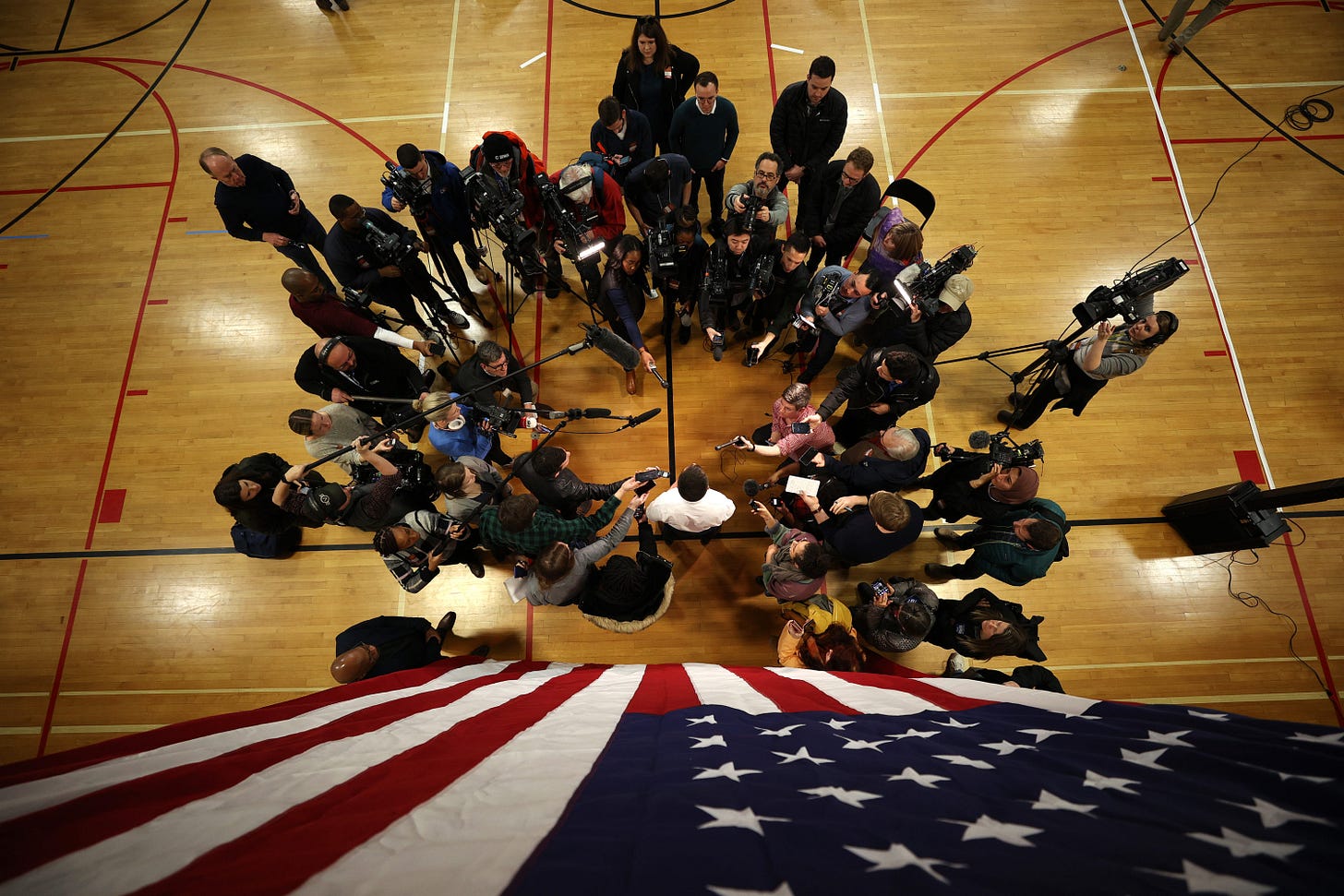Is the Iowa Democratic Caucus Democratic?
The Democrats' Iowa caucuses are super problematic.

The winner of tonight's first-in-nation presidential contest in Iowa will earn a big boost of credibility and momentum headed into the following early states. But why?
Are Iowa caucus-goers really the best representatives of the voters Democrats claim to represent and need to win a general election? Is it even fair? After all, the Democrats' chosen system seems to vastly prefer voters with means to participate in its highly-selective, time-consuming process.
Consider the requirements:
For starters, a caucus goer needs to have the night off. Events begin at 7 pm local time, which for many working-class folks represents the evening shift. And as long-shot candidate Andrew Yang often points out, some of the most common occupations in America are in retail work, food service, and trucking. What do those jobs have in common? Nighttime hours on the clock. Many of those workers would probably love to attend a caucus. Should they have to use a precious vacation day or give up a paid shift to do so? The Democratic caucus rules say that's the only way to have a voice in this process.
Then, there are parents. It doesn't matter if you are a married, two-income family, a divorced dad who has the kids that night, or a single mom who never has a husband to share child-rearing duties. Someone needs to watch the kids if a parent is going to stand around a caucus room running from corner to corner to support their candidate. Should they hire a babysitter, which imposes an additional cost on caucusing? Ask someone else to watch them for free while that person misses the caucus?
Elizabeth Warren’s campaign is considerately offering free childcare, and I'm sure her volunteers are lovely, but I, for one, wouldn't be willing to hand my children off to people I've never met before. Moreover, Warren's questionnaire for parents asks if they are willing to let the children watch movies and stay up past their bedtime. Speaking only for myself, the answer is, "no, not really." Free childcare from the Warren campaign takes care of the monetary cost. But the logistical costs of having toddlers up late come the next day. (Parents know what I mean. The hangover effect is real and it is not spectacular.)
And then there’s the actual caucus itself, as a process.
Caucus rules are complicated and don't resemble anything close to traditional voting: Beginning with a hard start time at 7 pm CST. Those who are not in line by then will see the doors shut in their faces; there are no absentee or mail-in options. If you’re sick, well, come on out and share your it’s-probably-not-coronavirus with your friends and neighbors!
Also: One of the nice things about friends and neighbors is that you can get along with them perfectly well without knowing anything about their politics because the secret ballot lets everyone be engaged, but also to keep their political preferences private.
Not the caucuses. You may get along with Jim and Eileen great at the Fourth of July block party, but once you find out they’re Gabbard supporters, forget about it.
And, as quaint as the images of friendly Iowans passionately advocating for their candidate before their friends, family, and neighbors is, this process by default, only includes those unafraid of promoting and displaying their political preferences in public. You can’t have "undercover voters" in a caucus. Everyone has to present themselves to be observed by the national press, cajoled by trained campaign advocates, and possibly subjected to online harassment and bullying by some online rando who doesn't agree with their final decision. What a way to spend a Monday night.
Oh—one more thing: If you show up to the caucus, there’s a good chance you won’t get to support the candidate you actually like best. Caucus rules mandate that any candidate who doesn't meet a 15 percent threshold gets axed from consideration. So if your preferred candidate doesn’t hit 15 percent—which is a pretty high threshold in a race where only half the candidates are even polling close to the line—then you have to leave, choose someone else, or try to form an "uncommitted" bloc. This process will likely stretch for hours and often leads to confusion over the final result, since there will be differences over the first "raw" count, the last count, and the number of delegates awarded to the candidates which determine the ultimate winner.
Yay, democracy.
When you look at this entire picture, you see that the number of people who actually choose the winner in Iowa—and hence punch the three tickets that traditionally move on to New Hampshire—is quite small. How small? Approximately 200,000 people will attend the Democratic caucuses out of the state's more than 3 million residents.
And, about that population…
Iowa's population is 90 percent white. Not that there’s anything wrong with that! But nationally, almost 40 percent of Democratic primary voters are minorities. Why give a state so wildly unrepresentative of the party such a big say in who the party chooses to nominate it?
And that’s not the only weird demographic. Because of all of the peculiarities of the caucus itself, Iowa naturally favors the participation of retirees and college students. Those to demographics are an important part of the Democratic coalition! But they are, you know, not the whole thing. Not by a long shot. Especially not at a moment when Democrats are working on a realignment by stealing educated, suburban voters from the Republican party.
I don’t really have a dog in this fight. I'm not an Iowan and I’m certainly not a Democrat. But to my Democratic friends in Iowa, I’d point out that the Republican party doesn't impose as many hurdles. The GOP's Iowa caucus is a secret ballot. Voters go in, vote, go out, and the votes are counted.
And most of the time, it works out pretty well.


